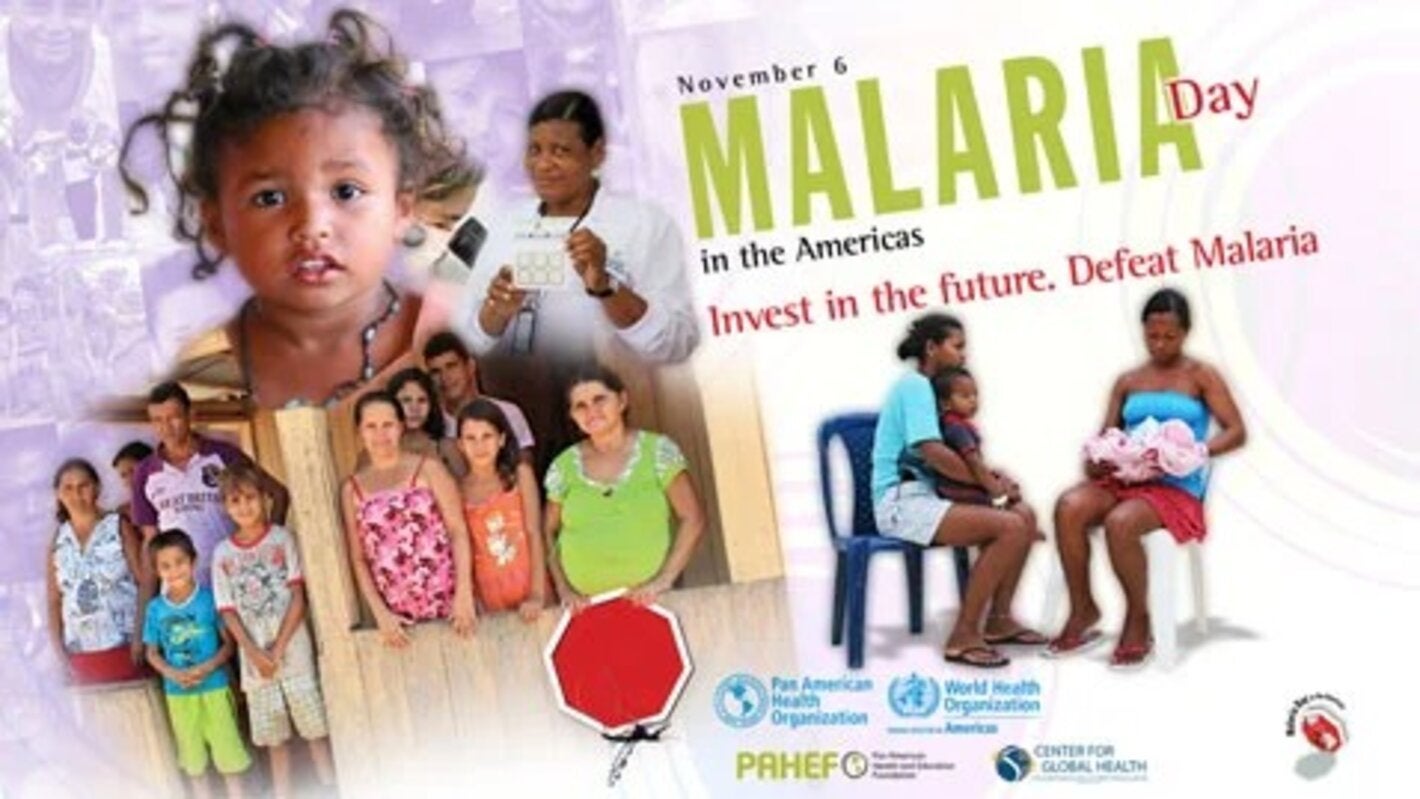
Washington, D.C., 7 November 2013 (PAHO/WHO) — Three initiatives from Colombia, Brazil and the Dominican Republic were recognized on Nov. 6 as the 2013 "Malaria Champions of the Americas" for being model projects that integrate malaria interventions with solutions to other health problems.
The top Malaria Champion award for 2013 went to the Colombia Malaria Project, an initiative that involves multiple organizations and operates in 45 municipalities where 70% of Colombia's malaria burden is concentrated. The announcement of the three winning projects was made during the commemoration of Malaria Day in the Americas at the headquarters of the Pan American Health Organization (PAHO), Regional Office for the Americas of the World Health Organization (WHO).
"These experiences serve as examples and a source of inspiration for others," said PAHO Deputy Director Jon K. Andrus, adding that PAHO/WHO is committed to sharing best practices and lessons learned to contribute to further progress in reducing malaria in the Americas.
The Colombia Malaria Project's accomplishments include creating sustainable local capacity through training for local health workers in malaria prevention and control and improving the well-being of the area's indigenous populations (Zenú, Embera Dóvida, Embera Eyavida, Nasa Kiwe, Guna Dule, Wounnan and Eperara Siapidara) as well as mestizos and Afro-descendant communities. In 2010, Colombia reported more than 115,000 malaria cases, 72% of which originating in these municipalities. By 2012, the number of reported cases had declined by nearly 50%.
The National Center for Control of Tropical Diseases (CENCET) of the Dominican Republic was recognized for its innovative use of technology in addressing each malaria case individually, for its close collaboration with stakeholders and non-health sectors (tourism, agricultural, construction), and for integrated vector management that also contributes to dengue control and lymphatic filariasis elimination. Between 2007 and 2012, the burden of malaria in the Dominican Republic declined by more than 78%. CENCET received a special citation for innovative cross-border efforts and linkages.
The Secretariat of Health of the State of Acre, Brazil, was recognized for its leadership in reducing malaria and its innovative efforts to address other health problems, including lymphatic filariasis and Chagas disease. In 2012, some 26,000 malaria cases were reported, a significant reduction in comparison with six years earlier. This is the third year that the program has been named a Malaria Champion of the Americas, and special recognition was given for its sustained excellence in malaria efforts.
Some 219 million people around the world suffer from malaria, and each year nearly 600,000 die from the disease. In the Americas, nearly 106 million people live in areas at high risk of malaria, although between 2000 and 2012 the number of cases in the region declined 60% and the number of deaths dropped 70%.
"This progress in the Americas is admirable and is the consequence of the resources and efforts invested by countries and their partners," said Andrus. He dedicated Malaria Day in the Americas 2013 to all those who work every day to reduce the suffering caused by malaria.
Elly Brtva, President of the Pan American Health and Education Foundation (PAHEF), said the elimination of malaria from the Americas is within reach and appealed to those who engage in philanthropic activities to support efforts to conquer the disease.
In a panel discussion on the economic challenges in the fight against malaria at the global and regional levels, Kathryn Andrews, of the African Leaders Malaria Alliance, pointed to gaps in financing for malaria control programs and called for efforts to keep the disease on the global agenda. Samantha Diamond, of the Clinton Health Access Initiative, described malaria elimination efforts and financing scenarios in Haiti. Fidel Zavala, of Johns Hopkins University, said that there has been great progress in development of a vaccine against P. falciparum and that it is important to keep working to further develop vaccines against the disease.
"The elimination of local transmission of malaria can and will be achieved," said Marcos Espinal, Director of PAHO's Department of Communicable Diseases and Health Analysis. He said the recognition of Malaria Champions of the Americas, made each year, is a mechanism for identifying and documenting successful malaria control experiences that can serve as examples for other countries and other regions of the world.
Malaria Day in the Americas, launched in 2007, seeks to raise awareness, build commitment and mobilize action to meet malaria reduction goals at the community, country and regional levels. The Malaria Champions of the Americas, launched in 2008, seeks to identify, celebrate and inspire excellence in efforts to fight the disease in the countries of the Americas. Both initiatives are organized each year by PAHO/WHO, PAHEF, and the Center for Global Health of the George Washington University, with the collaboration of other institutions.
PAHO, founded in 1902, is the oldest international public health organization in the world. It works with its member countries to improve the health and the quality of life of the people of the Americas. It serves as the Regional Office for the Americas of WHO and is part of the Inter-American system.



